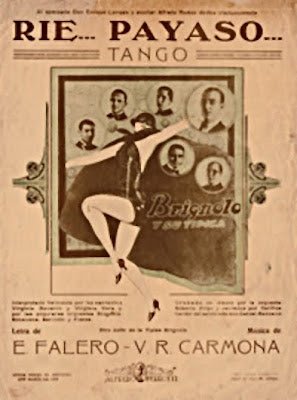Rie Paysano
Rie Payaso (RIDI PAGLIACCIO) Luciano Pavarotti
Rie Payaso is a wonderfully exciting tango. It's both playful and upbeat, but as so often in tango; lyrically it's telling quite a somber story. Written by Virgilio Carmona & Emilio Luis Ramon Falero in 1929, the song is based around the character Canio from the 1892 Italian opera "Pagliacci" (Clowns) by Ruggero Leoncavallo.
During Pagliacci's most famous aria "Vesti la giubba" ("Put on the costume"), Canio discovers his wife's infidelity, but must nevertheless prepare for his performance as Pagliaccio the clown because "the show must go on".
The aria is often regarded as one of the most moving in the operatic repertoire of the time. Canio's pain exemplifies the entire notion of the "tragic clown": smiling on the outside but crying on the inside. This imagery is still displayed in the clown motif often featuring the painted-on tear running down the cheek of the performer.
Cover of the first edition of Pagliacci
“...Put on your costume, powder your face. The people pay to be here, and they want to laugh. And if Harlequin shall steal your Columbina, laugh, clown, so the crowd will cheer!Turn your distress and tears into jest, your pain and sobbing into a funny face – Ah!
Laugh, clown, at your broken love! Laugh at the grief that poisons your heart!”
According to the Guinness Book of Records, the aria sung by Enrico Caruso, first recorded in November 1902, was the first million-selling record in history.
Vesti la giubba is often used in popular culture, and has been featured in many renditions, mentions, and spoofs. Our Tango hearts beat the strongest for D'Arienzo's 1940 arrangement of Rie Payaso:
Orquesta: Juan D'Arienzo Canta: Carlos Casares
RIE PAYASO / LAUGH, CLOWN!
MUSIC: VIRGILIO CARMONA
LYRICS: EMILIO LUIS RAMÓN FALERO
The Clown with his grimaces
and fulsome laughter
invites us, comrades,
to enjoy the carnival;
don't you notice in that laughter
a masquerading grief,
that his painted(1) face
secretes a truth from us.
Come Clown, I invite you,
companion of sorrows,
come and sit at my table
if you want to get drunk;
for if you have your griefs,
I too have mine
and Champagne makes you forget.
Laugh, your laughter infects me
with the divine magic
of your peerless humor.(2)
Let's drink a lot, let's drink because I wish,
with all of this money,
to make my carnival.
You cry, good friend, Clown,
Don't cry, for there are witnesses
who ignore(3) your woe;
dry your tears and laugh with mirth,
let's see, now, the waiter,
serve us more Champagne!
I too, like the Clown
of sad laughter,
have a shattered soul,
and too wish to forget;
to inebriate myself with pleasures
and unbridled orgies
with hired women
amongst music and Champagne.
One year ago, precisely,
at the very break of day,
I returned to my abode
with wishes of repose;
arriving I saw lit lamps
in the room of my darling...
it is best to not recall.
El Payaso con sus muecas
y su risa exagerada,
nos invita, camaradas,
a gozar del carnaval;
no notáis en esa risa
una pena disfrazada,
que su cara almidonada,
nos oculta una verdad.
Ven Payaso, yo te invito,
compañero de tristezas,
ven y siéntate a mi mesa
si te quieres embriagar;
que si tu tienes tus penas
yo también tengo las mías
y el champagne hace olvidar.
Ríe, tu risa me contagia
con la divina magia
de tu gracia sin par.
Bebamos mucho, bebamos porque quiero,
con todo este dinero
hacer mi carnaval.
Lloras, Payaso buen amigo.
No llores que hay testigos
que ignoran tu pesar;
seca tu llanto y ríe con alborozo,
a ver, pronto, ¡che mozo,
sírvanos más champagne!
Yo, también, como el Payaso
de la triste carcajada,
tengo el alma destrozada
y también quiero olvidar;
embriagarme de placeres
en orgías desenfrenadas
con mujeres alquiladas
entre música y champagne.
Hace uno año, justamente,
era muy de madrugada,
regresaba a mi morada
con deseos de descansar;
al llegar vi luz prendida
en el cuarto de mi amada...
es mejor no recordar.
--
1. Literally, almidonada means "starched" or "starchy", referring to the main ingredient of white "grease paint" was done in those days.
2. Gracia means two things, either "grace" or "humor" (i.e. the quality/ability of being funny), the latter is most appropriate, but I feel that a tinge of the former meaning is also present.
3. Ignorar in Spanish has a stronger feeling of "not knowing" than actively "ignoring".


